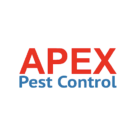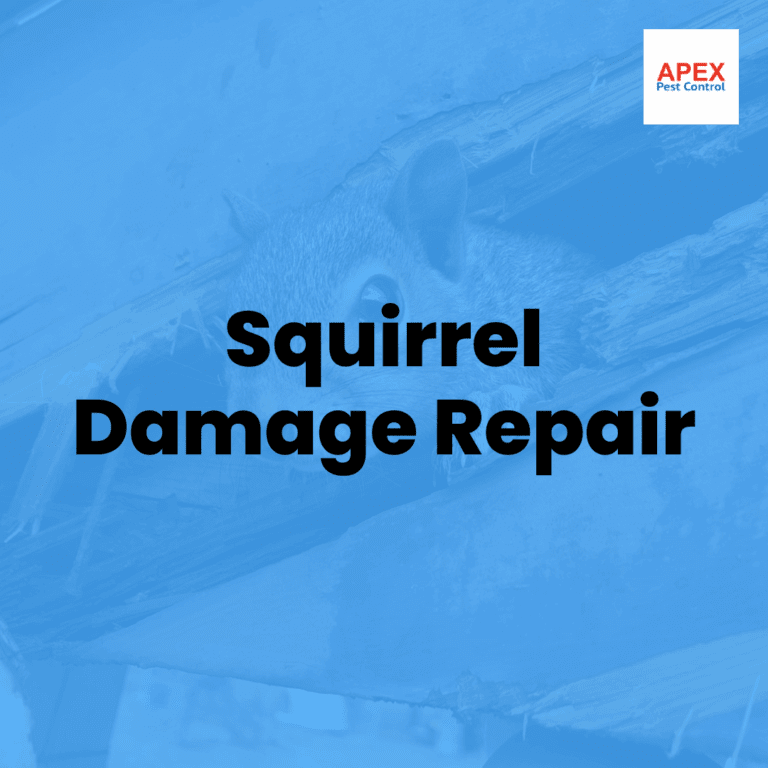How to Fix and Prevent Squirrel Damage to Your Home
Hearing scratching in your loft at dawn? Grey squirrels could be the culprits. These invasive rodents cause significant damage to UK homes, gnawing wires, nesting in insulation, and disrupting gardens. Left unchecked, their activity can lead to fire hazards, structural issues, and health risks, costing homeowners hundreds or thousands in repairs.
This guide helps you identify squirrel problems, repair damage, and protect your property with DIY or professional solutions. Act now to safeguard your home and support native red squirrels by managing these pests responsibly.
Discover the key traits of Squirrel Behaviour in the UK with our in-depth guide, covering nesting habits, feeding patterns, and seasonal activity essential for effective and humane control.
Spotting Squirrel Trouble
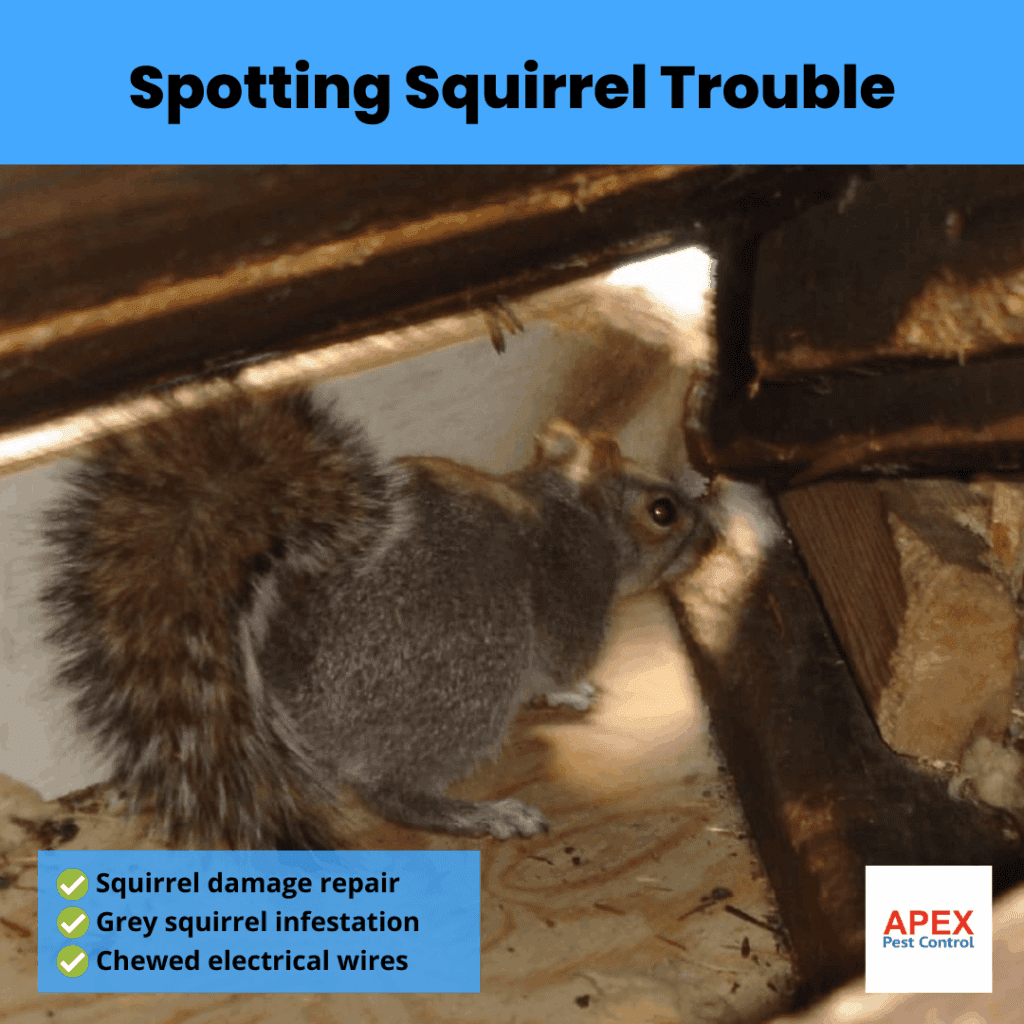
Early detection of grey squirrels prevents costly repairs. Look for these telltale signs to confirm an infestation.
Common Signs of Squirrels
- Noises: Scampering, scratching, or gnawing in lofts or walls, especially at dawn and dusk.
- Droppings: Larger and rounder than rat droppings, often with a central bulge, found in lofts or gardens.
- Damage: Chewed electrical wires, torn insulation, gnawed wood, or holes in roof tiles.
Where Squirrels Cause Damage
- Lofts and Attics: Squirrels nest in high, safe spots, gnawing beams and wires, risking fire and structural damage.
- Gardens and Yards: They dig up bulbs, strip bark, and eat seeds, harming plants and trees.
- Walls and Insulation: Inside walls, squirrels shred insulation and chew cables, raising energy bills and fire risks.
Health Risks
Squirrel droppings and urine may carry leptospirosis and salmonella, posing health hazards. Inhaling dust from their waste can harm your lungs, so use protective equipment during cleanup.
“Grey squirrels can turn your loft into a health risk if not addressed promptly.” — Dr Jane Smith, Pest Control Expert
Statistic: Squirrel damage can cost UK homeowners between £500 and £30,000, with electrical repairs often the most expensive.
Checking the Damage
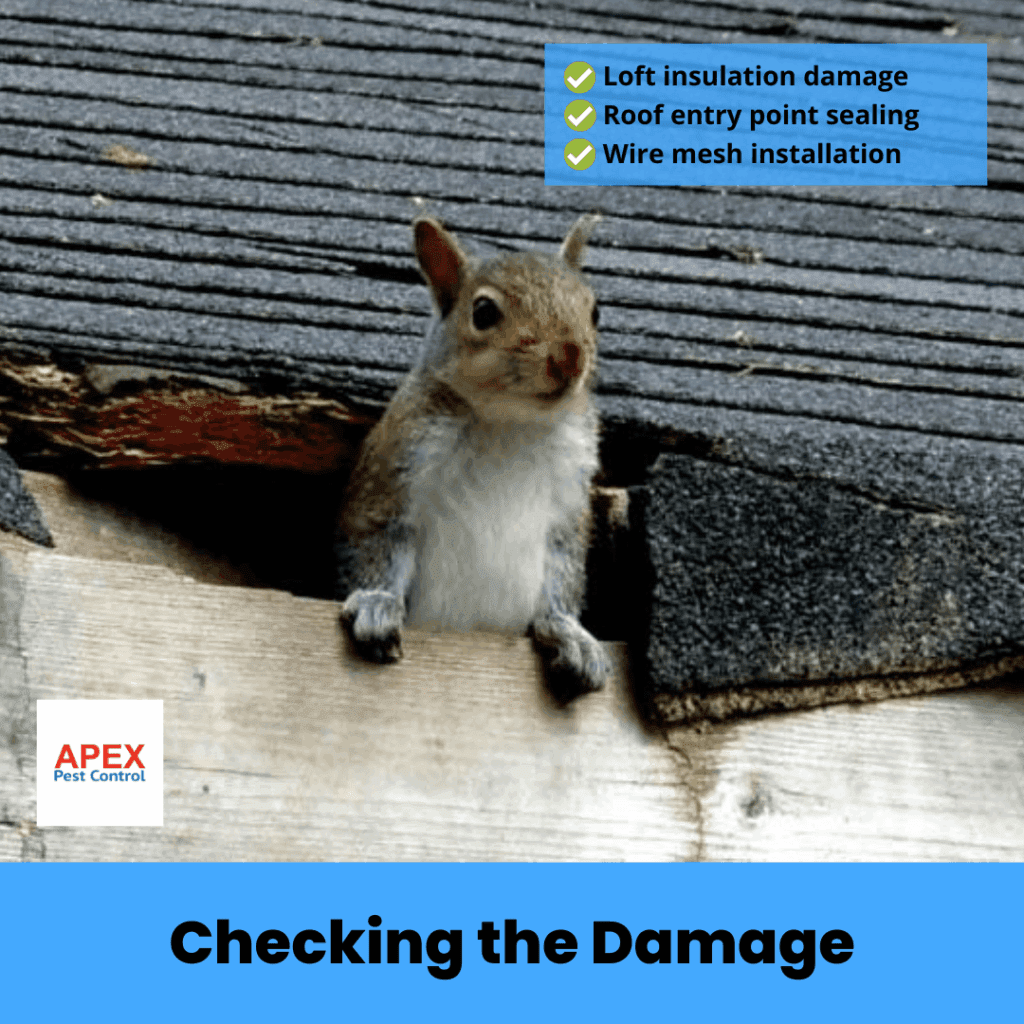
Assessing squirrel damage is crucial before deciding on repairs. Choose between a professional inspection or a safe DIY approach.
Hiring a Professional
Wildlife management experts provide reliable inspections.
- Why It Helps: Professionals use tools like camera traps to locate hidden nests and entry points, leveraging their expertise in squirrel behaviour.
- What They Do: They check lofts for nests, roofs for holes, and wires for chewing, while assessing health risks from droppings.
DIY Inspection
For DIY checks, prioritise safety to avoid health risks.
- Stay Safe: Wear gloves and a mask to protect against diseases from droppings or urine.
- Where to Look: Inspect lofts, corners, and baseboards indoors; check trees, fences, vents, and soffits outdoors for entry points.
Fixing Squirrel Damage
Prompt repairs prevent further damage. Address entry points, insulation, gardens, and sanitation with these steps.
Sealing Holes and Entry Points
Squirrels exploit small gaps. Block them to stop re-entry.
- Use 16-gauge wire mesh, sheet metal, or hardware cloth to seal roof or wall holes.
- Apply caulk for minor gaps, but consult a roofer for significant roof or soffit damage.
- Tip: Professionals can install one-way exclusion funnels to allow squirrels to exit without returning.
Replacing Insulation
Torn insulation increases energy costs and health risks.
- Replace damaged insulation promptly.
- For urine-contaminated areas, hire professionals to clean and sanitise, ensuring safety.
Restoring Gardens
Protect your garden from squirrel damage.
- Install squirrel-proof bird feeders to secure seeds.
- Cover bulbs with galvanised mesh and plant squirrel-resistant species like daffodils or marigolds.
- Use fencing or bamboo skewers to deter digging.
Cleaning and Sanitising
Squirrel waste spreads disease, so clean thoroughly.
- Use a 1:10 bleach solution or HSE-approved sanitiser on droppings and urine.
- Vacuum dust while wearing a mask to avoid inhaling harmful particles.
DIY vs Professional Squirrel Control
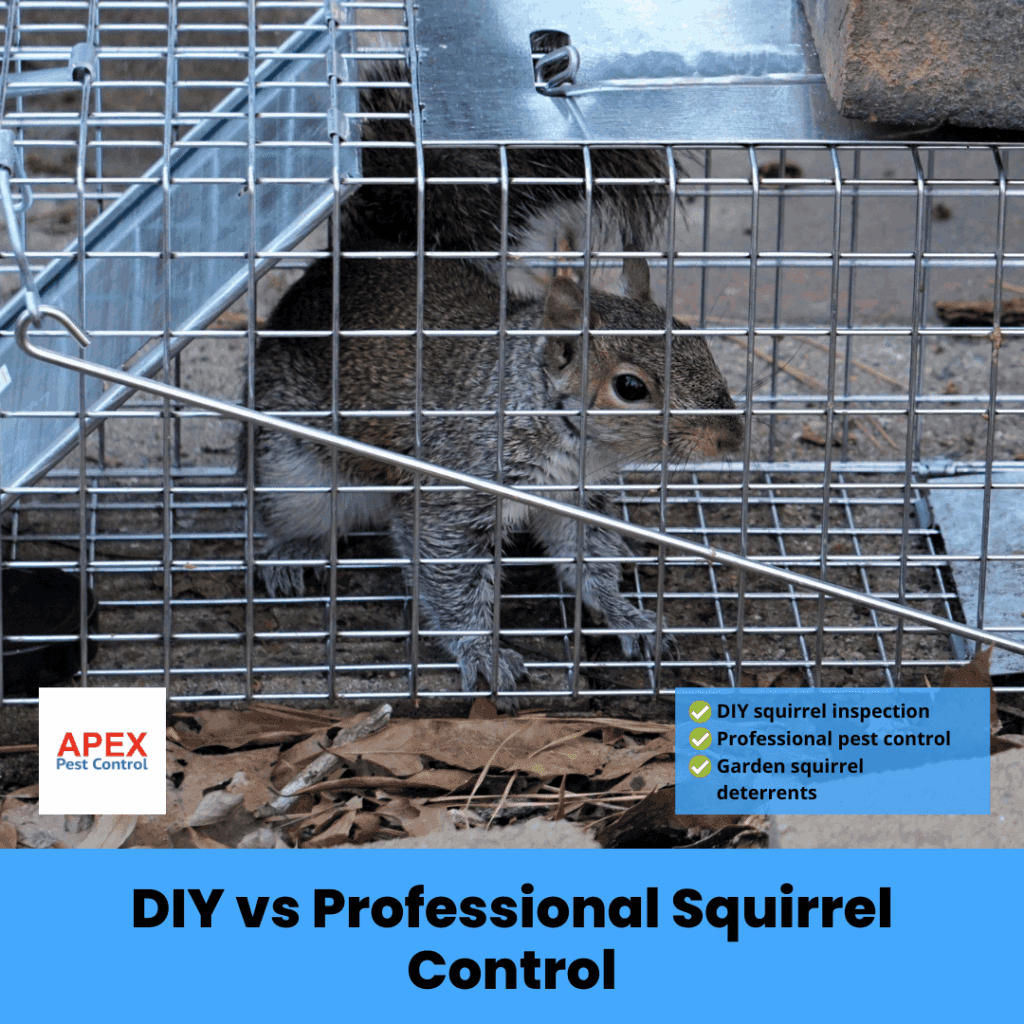
Should you tackle squirrels yourself or hire an expert? This table compares both options.
| Method | Pros | Cons |
|---|---|---|
| DIY |
|
|
| Professional |
|
|
Statistic: Professional squirrel removal costs £200 to £1,000, depending on infestation severity.
Stopping Squirrels for Good
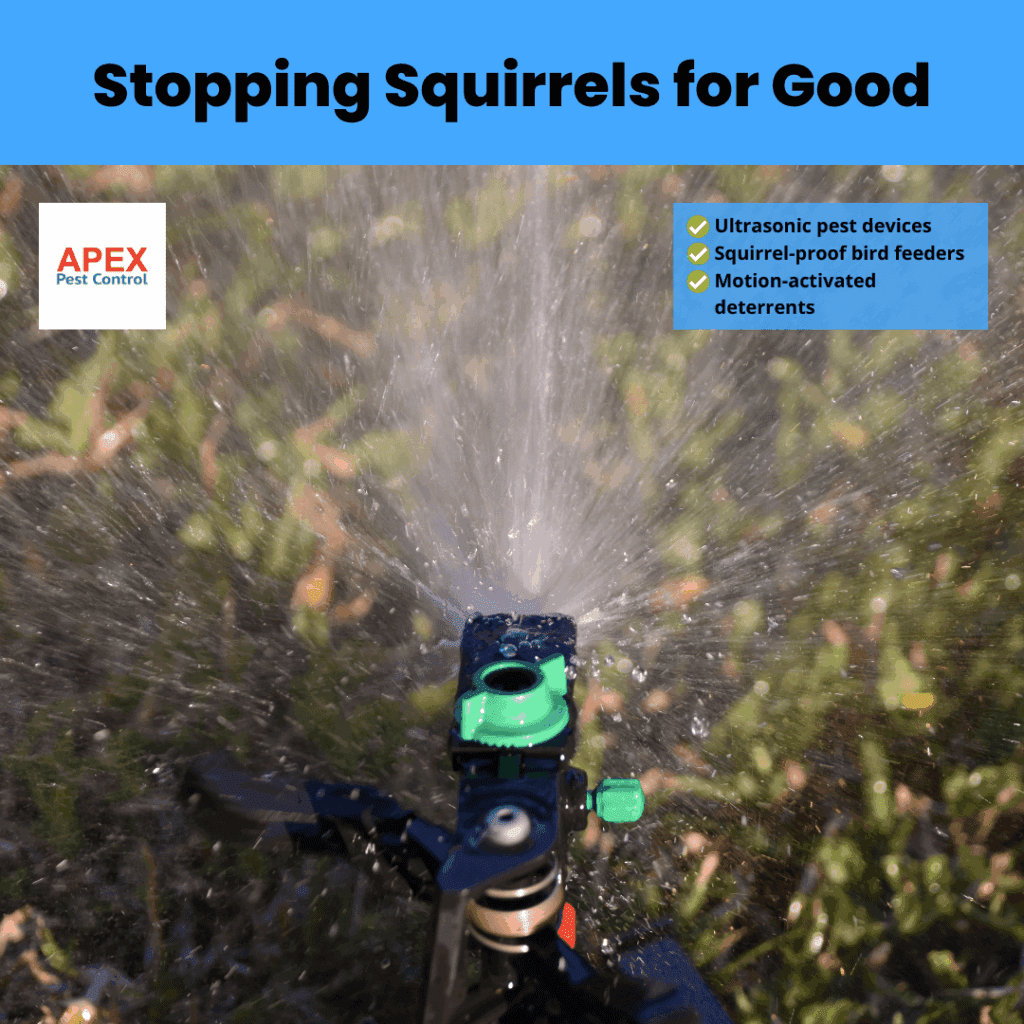
Preventing squirrel infestations saves time and money. Use these eco-friendly, compliant measures.
Natural Deterrents
Squirrels avoid certain scents and textures.
- Spray cayenne pepper and water or plant mint in gardens.
- Scatter coffee beans, human hair, or blood meal near plants.
- Tip: Reapply after rain for effectiveness.
Commercial Deterrents
Shop-bought solutions offer additional protection.
- Motion-activated sprinklers startle squirrels with water bursts.
- Ultrasonic devices emit sounds inaudible to humans but irritating to squirrels.
Regular Checks
Routine maintenance prevents infestations.
- Trim tree branches near roofs to block access.
- Inspect vents, chimneys, and eaves for gaps in spring and autumn.
- Early action can save £500 to £30,000 by stopping damage early.
UK Legal Requirements
Grey squirrels are invasive under UK law, requiring strict compliance.
- The Invasive Alien Species Order 2019 prohibits releasing trapped grey squirrels.
- Humane dispatch is mandatory, typically handled by licensed professionals to avoid penalties.
- Ecological Note: Controlling grey squirrels protects native red squirrels and woodlands.
When to Call an Expert?

Some situations demand professional intervention. Contact a licensed pest controller if you notice:
- Weak roofs or walls from gnawed beams.
- Chewed electrical wires, increasing fire risk.
- Urine-stained ceilings or contaminated water tanks.
Why Professionals Are Effective
BPCA-accredited experts resolve issues safely and legally.
- They use box traps or one-way doors for humane removal.
- They repair damage and provide prevention advice.
- They ensure compliance with the Wildlife and Countryside Act 1981 and Wild Mammals (Protection) Act 1996.
Choosing a Provider
Select a reputable pest control company.
- Look for BPCA or RSPH accreditation, insurance, and positive reviews.
- Ask about humane methods and prevention guarantees.
- Tip: Confirm they use exclusion funnels for lasting results.
Popular Questions About Squirrel Damage
What smells deter squirrels?
Grey squirrels avoid peppermint oil, cayenne pepper, and ammonia. Apply sprays or soaked cotton balls near entry points, lofts, or plants. Reapply after rain for best results. These humane, non-toxic deterrents complement other pest control methods.
How much does squirrel damage repair cost?
Costs range from £500 for minor insulation fixes to £30,000 for major repairs to wiring, roof timbers, or asbestos ceilings. A professional survey provides an accurate estimate.
Can squirrels cause fires?
Yes. Squirrels chew wires to manage tooth growth, exposing cables that may spark or arc, causing loft fires. Regular inspections and proofing reduce this risk.
Are squirrels dangerous to my health?
Squirrel droppings and urine may carry leptospirosis and salmonella. Use personal protective equipment (PPE) or hire a licensed pest controller for safe cleanup.
How do I squirrel-proof my garden?
Cover bulbs with galvanised mesh, plant daffodils, and use squirrel-proof feeders. Trim branches near roofs and secure compost bins to reduce access.
Is it legal to release grey squirrels?
No. The Invasive Alien Species Order 2019 prohibits releasing trapped grey squirrels. Licensed professionals must humanely dispatch them to protect native species.
How do I know if squirrels are in my loft?
Listen for scratching or gnawing at dawn or dusk. Check for droppings, chewed wires, or nesting materials. A professional inspection confirms their presence.
Conclusion
Grey squirrels may seem harmless, but their gnawing and nesting can damage lofts, gardens, and wiring, costing £500 to £30,000 in repairs. Spot early signs like scratching or droppings, seal entry points with wire mesh, and use deterrents like cayenne pepper.
DIY methods work for minor issues, but fire risks or major damage require BPCA-accredited professionals. Inspect your home today, and if you find chewed wires, contact a licensed pest controller to avoid costly repairs. Protect your property and support native red squirrels by addressing invasive pests now.
Squirrels causing chaos in your South Yorkshire home?
Contact Apex Pest Control, your local BPCA-accredited and NPTA experts in humane squirrel removal. Call 0114 349 1098 for a professional inspection and lasting solutions.

Tony Johnson, Founder & Lead Technician at Apex Pest Control, is a BPCA and NPTA accredited pest management expert with over 35 years’ hands-on experience. Tony specialises in Integrated Pest Management and ensures all services comply with UK pest legislation, including the Wildlife and Countryside Act 1981 and COSHH Regulations 2002. His commitment to continual learning and adapting to industry best practices means clients receive effective, safe solutions for pests affecting homes and businesses across South Yorkshire. Tony’s dedication to professional standards, ethical treatment methods, and local expertise has made him a trusted partner for pest control and prevention.
-
BPCA & NPTA accredited | CHAS certified
-
Committed to UK pest law compliance & safety
-
Focused on effective, ethical pest management for South Yorkshire
